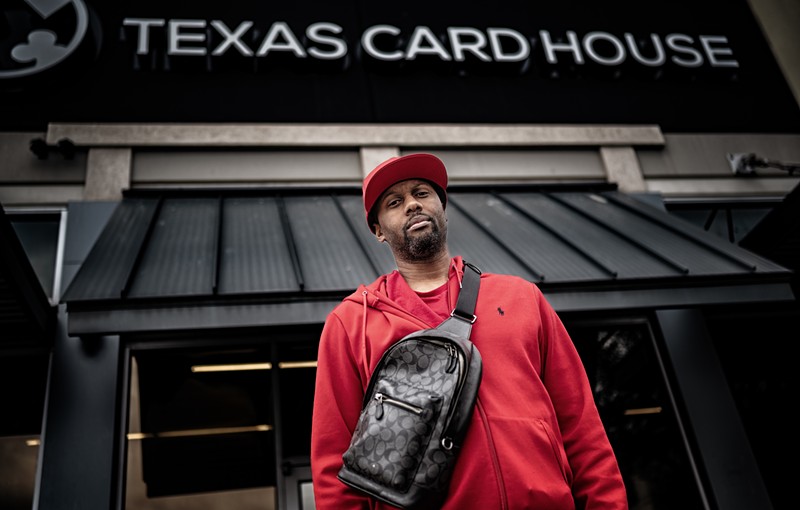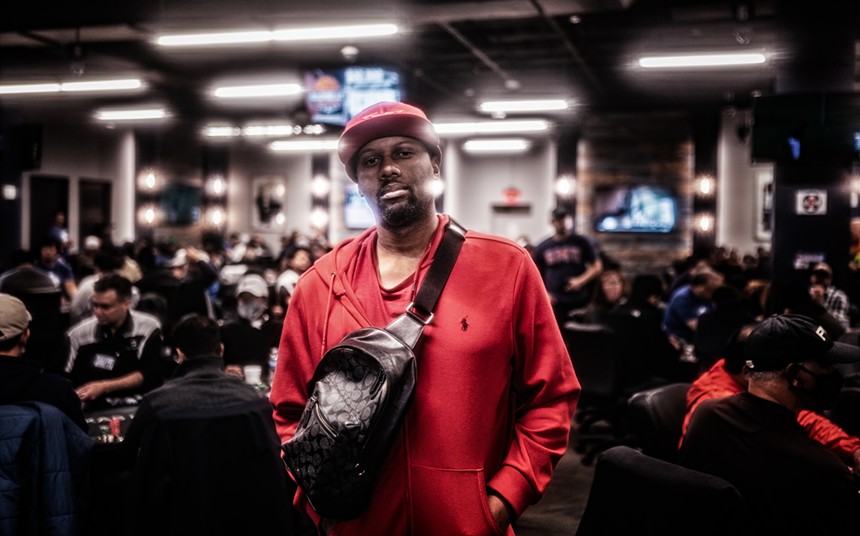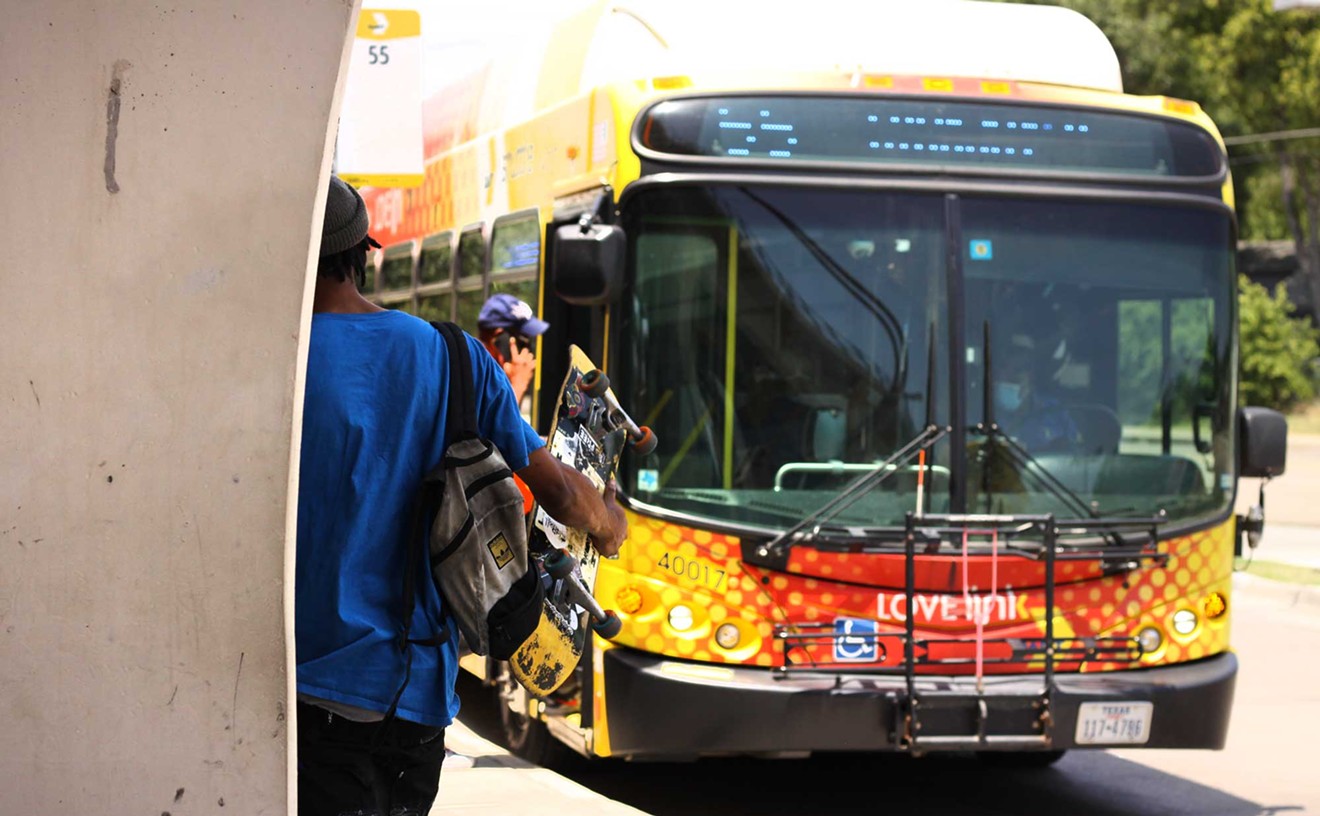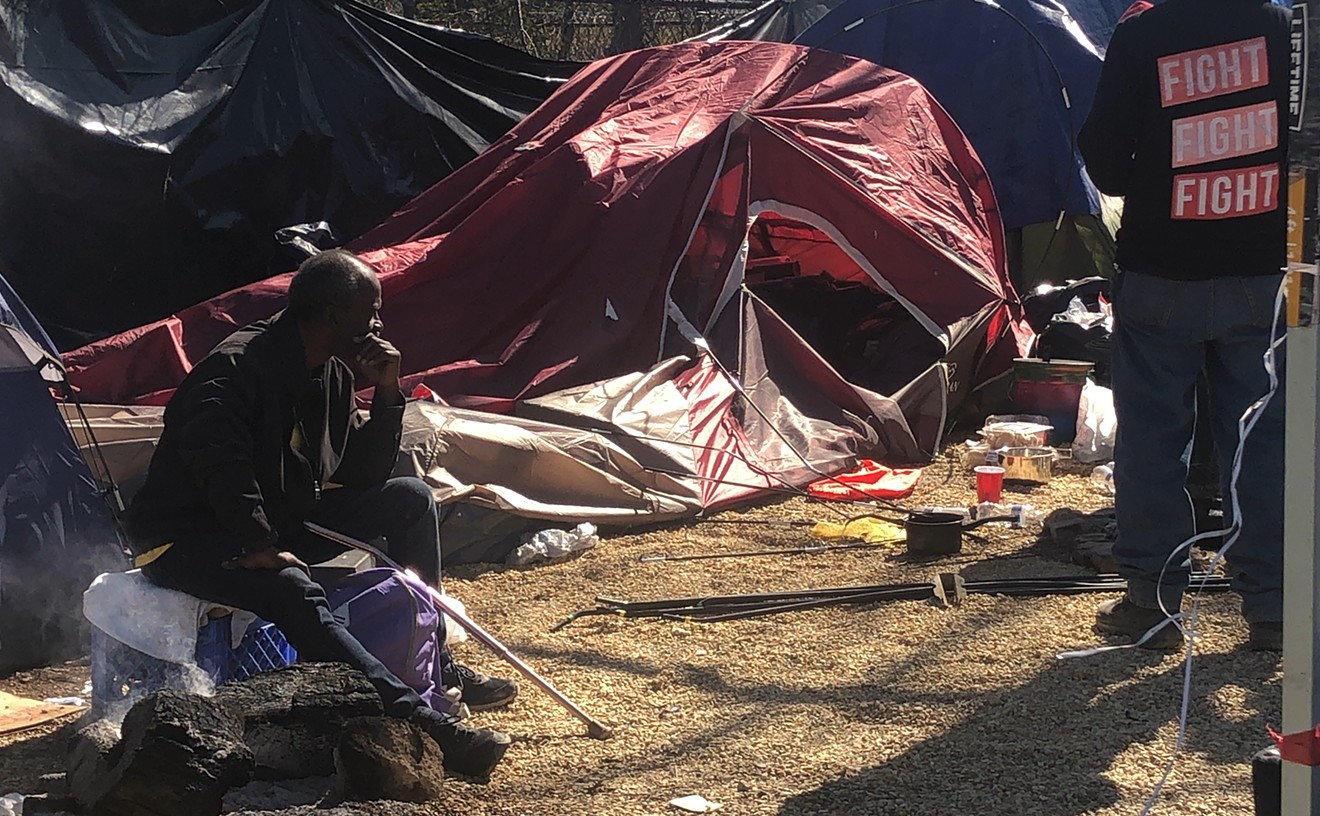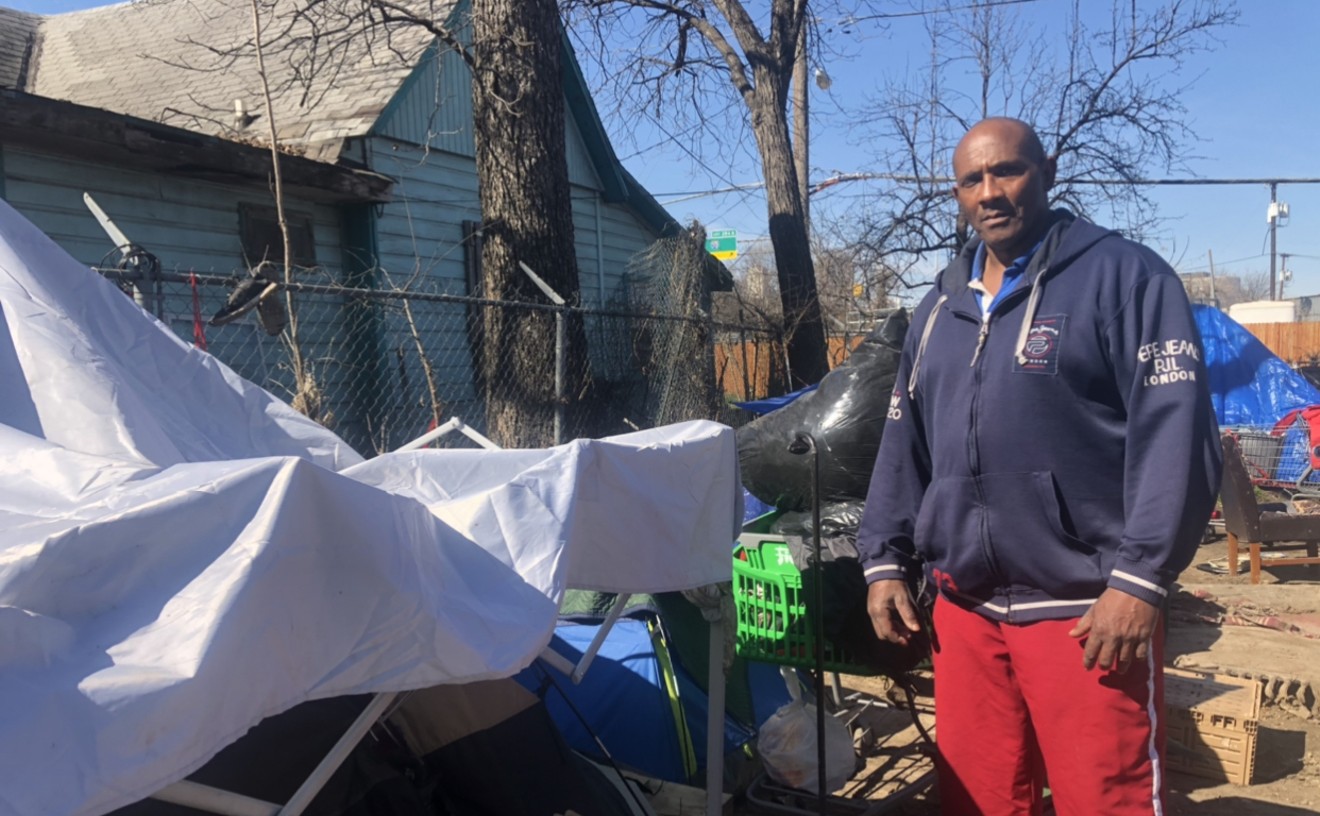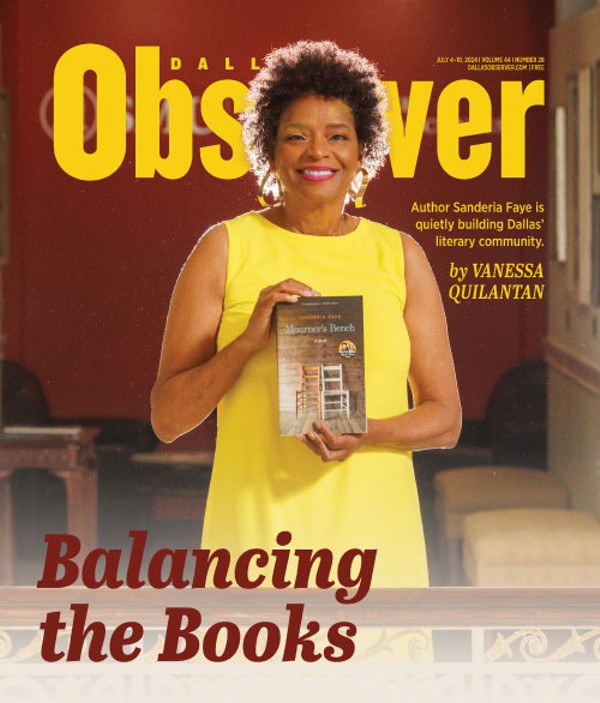The operation lacks the glitz of a Vegas casino. Texas Card House is BYOB only. You can drop off your bottle with one of the waitresses at a snack bar near the entrance and she’ll bring you drinks as you play. But there’s no buffet or endless din of slots, just 26 or so semicircular tables with four to six players each, focused on the cards. One of them is Shomari Williams, 38, a regular in Dallas’ poker scene.
He places bets, folding periodically, winning hands strategically, but he doesn’t consider it gambling. Like many players, he says poker is a game of skill and strategy, not chance. Play it right, and poker can be a lucrative side hustle. Play it like a pro, and poker can become a living.
Williams plays like a pro in poker rooms across Dallas-Fort Worth, but his days of placing bets at Texas Card House or any of the other legal poker rooms in the city may be numbered. Two years after the city granted Texas Card House a permit to operate, the City Council is trying to shut it and other above-ground poker rooms down by revoking their certificates of occupancy.
The city now says the rooms are illegal. Local players say if illegal activity is going on, it’s happening in the underground scene, where players will flock if legal establishments are closed.
The smart money says the question is heading to a showdown in court if the city rejects the card rooms’ efforts to appeal the revocation of their certificates of occupancy. Whatever the outcome, players like Williams say the games will go on, much as they did before the city issued its first permit for a card room.
Williams should know. He’s been playing poker for about 15 years, professionally for about three. “I’ve been involved in the Dallas and Fort Worth scene for quite a bit,” said the graduate of the University of Nevada, Las Vegas, where he played poker as a student in the 2000s.
“When I started getting into it, I met a player who was a professional, and he had told me if I just played poker and didn’t play any other games — slots, blackjack, craps — that I could have a side income eventually,” Williams recalled. “And as long as I stayed away from everything else, I could play a skill-based game and really not have to worry about a whole lot. From that point on, I never played anything outside of poker.”
When he moved to North Texas, Williams started playing at Winstar casino in Oklahoma and researching how he could become better. His regular job was as a “fleet buyer” for the city of Fort Worth, responsible for purchasing police cars, firetrucks and other vehicles.
“After work, I would always go and play,” he said. “I’d play in big tournaments, some of them being $1,000, $500 entries, and I started collecting some pretty decent sized hits.”
In 2019, he made $56,000 just playing poker tournaments. “It really shocked me because I was working full time at a job making $40,000 a year, and here I was on the weekend and after like two or three months I was up $56,000 in poker tournaments,” Williams said.
In early 2020, Dallas approved its first legal poker room, Texas Card House. Owners of the poker club declined to talk to the Observer on the record, citing tensions with the city. But Ryan Crow, Texas Card House’s CEO, told D Magazine in January that the place has been busy since opening. “We knew when we opened it was going to be busy,” Crow told D. “But we didn’t know how big some of the games would be. When we do a tournament, people fly in internationally.”
At the legal rooms, players pay a membership fee and an hourly fee. A floor manager hovers around to handle any situation dealers can’t. Williams said new players should stick to lower stakes games, but whatever the stakes, if you want to make money at poker, you have to play smart. “If you’re not comfortable with the amount of money you have in front of you, then you’re not going to play correctly regardless of your skill level,” he said.
“There are a lot of players that believe any two cards can win. In a given situation, yes that’s true, but over the long term, the ‘any two cards’ mantra doesn’t win,” Williams added. “I haven’t built an income for myself just playing every hand. I built an income by being selective about the hands that I play.”
He also tries to be aggressive at the table. “The person who is aggressive and raising a lot, making the pot more expensive, is going to fare better than someone who is playing very passive and checking and not maximizing their cards,” he said.
Things continued to go well for him – and then the pandemic struck.“There are still underground rooms that are still flourishing even though there is a legal option." - poker player Shomari Williams
tweet this
“All of the rooms had shut down. The casinos had stopped playing poker,” he said. “I was like ‘Great, here I was with this great opportunity to start pushing my poker career forward and then COVID happened and I couldn’t play anywhere.’ That’s when the underground games started pulling people in because there really was nowhere else to play.”
At the time, public health officials cautioned against large gatherings. Williams figured he’d put a mask on and hit the underground rooms anyway. “I started making money in the underground scene. I was making a good side income,” he said. “It was the first time I had ever delved into that world. Of course, you’ve got the things in the back of your head: Am I going to get robbed? Are the police going to run in? Is it crazy? Are there drugs?”
The rooms where he played didn’t seem to be festering with illegal activity, though the underground scene is rowdier and can be more fun, he said, which is why some people prefer it.
“There are still underground rooms that are still flourishing even though there is a legal option,” Williams said. “The underground rooms traditionally are a more fun environment. The players at the underground rooms are more fun. They spend a lot more money. They have a lot more action. The waitresses are cute. There’s free alcohol, there’s free food. … It’s just, to a professional, the rake is a little bit unattractive.”
“The rake” refers to the share of each pot claimed by the house. It’s how organizers of underground games make their money and pay for the free food and drinks. In Texas, where gambling is generally illegal, it’s arguably the difference between a legal card room, which doesn’t have a rake, and an illegal one.
That’s one interpretation of the gray area in Texas law, anyway, though not everyone agrees the state allows poker rooms to operate at all, rake or no rake. It depends on which lawyer you ask, or in the case of Dallas’ attorneys, when you ask them.
Last year, Williams applied for a promotion with Fort Worth. “I didn’t get it,” he said. “It didn’t look like I was really going to move forward and progress in that position, so I put in my two weeks’ notice. That was last June.”
He’s played poker full time since, though the transition wasn’t seamless. Expecting a pension payout from Fort Worth, he promised his family a trip to Cancun. But the pension money didn’t come in time, and he was strapped for cash to take his family on the trip. Then he heard about a tournament at a local legal room called Shuffle 214.
“They guaranteed a $100,000 prize pool, and the tournament was a $500 entry,” Williams said. “I outlasted 256 players, finishing in third place for over $12,356. Then we took that well-deserved trip to Cancun.”
Since then, he’s started a YouTube channel following his playing. These days, he focuses more on the legal rooms because they don’t take a rake and are safer.
“When you play in an underground game, your profit is very very small,” he said. “And a lot of players believe you can’t even beat certain underground games because they’re taking too much out of the pot. That is why the legal rooms present a much better option.”
In the legal rooms, he doesn’t have to worry about getting arrested. If the legal rooms shut down, though, Williams said players will either go underground or out of state.
Neither seems ideal to Trey Sweeney, another local player. “It just pushes those dollars to underground rooms, which aren’t taxed,” Sweeney said. “Or, it pushes them out of state. I think that’s a real shame because, like I say, it’s a game of skill.”
Sweeney said he’s been playing cash home games since he was a teenager. “It became an avenue to make profit off some fish,” he said, referring to less experienced players.
He’s played in Las Vegas poker tournaments. He’s been to Texas Card House a handful of times and has some experience in the underground scene. But these days, he mostly plays cash games with friends like he did when he started as a teenager.
When he does go out to play, he said he doesn’t see anything too out of turn going on in the illegal rooms. “It feels more like a house party where there’s poker being played opposed to at a casino where people are strictly playing,” Sweeney said. “If games do get pushed underground, it becomes more gambling because you can’t win,” he said. “I think that would be the incorrect decision for the city to make from an economic standpoint.”
For some, the legal rooms just feel safer.
Rebecca Thompson has been playing poker for about 20 years. For about the last decade, she’s played professionally. Thompson is also an advocate with Poker League of Nations, the world's largest women’s poker organization.
When Thompson first got into poker, it was in a thriving underground scene in DFW. She said she was involved in three raids of illegal poker games. On those occasions, though, she and many of the other players got off with tickets.
Thompson was happy when legal clubs began opening in Dallas because she had a place nearby where she felt safer and didn’t have to worry about the law. While she has plenty of friends in the underground scene, these days she sticks to the legal rooms. If they get shut down, she thinks people will just flock to the underground.
“People are going to play,” she said. “They’re going to play wherever.”“Even though they are claiming this is an upscale facility, poker is poker, and poker is illegal." - Deb Borrell, card room opponent
tweet this
That, she said, will likely lead to more crime, “because those running the establishments are less likely to want to get the police involved should something happen,” she said.
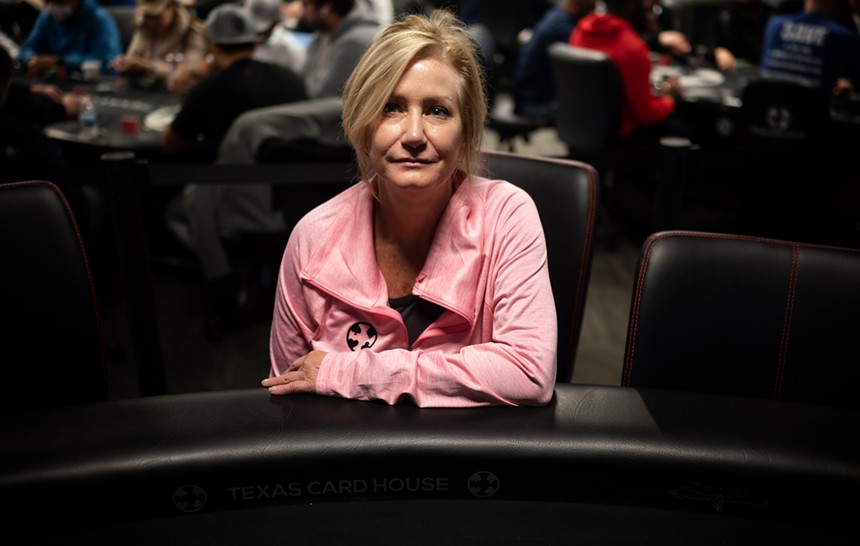
Rebecca Thompson was involved in three raids of illegal poker games and got off with just a ticket.
Mike Brooks
According to The Dallas Morning News, two men got into a shootout at another illegal game room in Dallas last may. Thong Nguyen worked at the room and stuffed a large amount of cash in his shirt pocket, police said in an affidavit. This was captured on a surveillance camera at the room. The other man, Laurentino Belmares Jr., appeared to notice what Nguyen was doing.
As Nguyen was trying to walk Belmares out, Belmares pulled a gun and tried to take the cash, police said. Nguyen pulled out his own gun and the two shot each other. Nguyen was struck in the head and died three days later. Belmares was wounded in the ankle and was arrested.
Devon Palk, DPD’s special investigations major, told the Observer last year that this isn’t all that uncommon and police usually go after gambling rooms tied to violent crime. Illegal gambling in the city is handled by DPD’s vice unit. At that time in July 2021, the unit had executed 27 warrants involving game rooms in the city. He said they’d also received around 75 complaints of illegal gambling.
“There is a spectrum,” he explained. “A lot of what we focus on, primarily, are locations that have ties to violent crime. Some of these illegal gambling locations, you have shootings.“When you’re kind of in the illegal side of gambling, you’ve got people with firearms, you’ve got alcohol being consumed, you’ve got narcotics being consumed. Somebody doesn’t get paid out, you know, sometimes it turns violent.”
Players contend legal card rooms are the answer to crime in the underground scene. More people are looking to open up new legal rooms or expand existing ones. Still, not everyone is happy about that.
City Council member Cara Mendelsohn has said she thinks the city code should be changed to require specific use permits or consider nearby residential zoning. This way, poker rooms won’t end up where they’re not wanted.
Under one interpretation of the law, Texans are allowed to operate a poker game in private establishments as long as the hosts don’t take a cut of the action and everyone has an equal chance of winning. Some thought the law left room for legal business ventures in the poker world, and they set up shop across Texas, including in Dallas.
They operate the rooms as private clubs, they don’t take a rake, and everyone has an equal chance, giving clubs a defense against prosecution for illegal gambling. In games like blackjack, craps or roulette, the house has the advantage, which makes those games illegal.
City Council member Cara Mendelsohn, who represents District 12, has said she doesn’t recognize any “loophole.” Gambling is illegal in Texas and poker players are placing bets, so whether that’s happening in a private club, and whether there is a rake, are moot points to Mendelsohn.
If people want to gamble legally in Texas, she said, they should head to Austin and get the law changed.
Some Dallas residents have also fought the expansion and opening of more poker houses. Several showed up to a City Council meeting in August to speak out against a group called Champions that wanted to open a poker house in the footprint of an old Three Forks restaurant location in North Dallas.
Deb Borrell lives on Cape Correll Drive and is the secretary for the homeowners association for Bent Tree North. She’s lived in the neighborhood for three years and has worked in the area since the 1980s. She’s in real estate and says a poker room will lower nearby property values. “I don’t know too many people who would want to live in a residential neighborhood adjacent and at the main entrance near a poker room,” she said.
There was also a robbery at the Veterans Underground Poker Tournament at Trinity Mills Road.
“This is less than one quarter mile from the proposed location,” she said. “Even though they are claiming this is an upscale facility, poker is poker, and poker is illegal. It is inappropriate, and it is a liability next to a neighborhood with 630 family homes, churches, schools and playgrounds.”
Jeremy Camp, the president of the board of directors of the Homeowners Association for Bent Tree North, said, “I’ve seen hundreds of residents attend town halls to adamantly and uniformly voice their opposition, over 1,000 signing a petition in just a matter of days, more than 100 people showing up for a peaceful protest.”
He said he received hundreds of emails from members of their HOA opposed to the establishment. “Based on all that feedback, I will tell you that our residents and residents of many of our surrounding neighborhoods don’t understand how this could happen and feel that the city has let them down,” he said. “They’ve been told there’s nothing the city can really do.”
But he says the city could enact regulations of where these businesses can operate or enforce criminal laws “that clearly bar the operation of these gambling places.”
“I’m deeply concerned about the safety of my family and our community, not just because of the serious risk of violent crime around the premises, such as the horrific armed robberies and assaults that have been reported happening at other poker clubs, but also because the parking lot of this poker club exits directly into my neighborhood street,” Camp said. “Today it’s my neighborhood, but tomorrow it could be any residential area in the city which is at risk of the same thing happening to them.”
The residents and City Council members were successful in shutting down one poker house completely and stalled the opening of the Champions club by getting its permits denied in August.
“After a very thorough process to evaluate the legality of the business model proposed, the City Attorney's office has deemed it illegal as outlined by state law,” Mendelsohn said in a Facebook post about Champions. “The city will stand up to any legal challenges to this determination.”
Champions sued, and now the city isn’t talking because of pending litigation.
Texas Attorney General Ken Paxton’s office didn’t respond to the Observer’s requests for comment on the legality of poker rooms in Texas. He declined to provide a legal opinion on membership poker clubs in 2018, citing pending litigation.
“Our agency has a longstanding policy of not issuing an opinion on an issue we know to be the subject of pending litigation,” a spokesperson for Paxton’s office told KHOU at the time. His position hasn’t changed since then.
Past Texas attorney generals have taken a more openly hostile stance against poker and gambling. Former Texas Attorney General Will Wilson told voters he would close down casinos in the state. He and the Texas Rangers spent several years in the mid-’50s trying to shut down a famous club in Galveston called the Balinese Room. A backroom at the club had the latest gambling equipment and would bring in hot shot entertainers like Frank Sinatra.
The Texas Rangers tried to catch gamblers in the act at the Balinese Room with no luck in the beginning. The club was located at the end of a pier, and the house band knew to start playing “The Eyes of Texas” any time they saw the Rangers approaching.
People in the club would hear the song and know they had moments to hide the gambling paraphernalia before the Rangers came busting in.
In the end, the Rangers had to execute an undercover operation to get the club closed down in 1957.
In more recent years, poker rooms have been able to open in Texas cities without much trouble from the law. Whenever there were busts, they would usually just result in misdemeanors.
That began to change in 2019. Zack Fertitta, a Houston attorney who represented one of the city’s biggest poker clubs, explained this transition in an article for texasbar.com. Clubs in Houston started to become more prominent, Fertitta wrote. In just a two-year period, one of the city’s clubs had made over $6 million.
In May 2019, two of the city’s largest poker clubs were raided.
In a press release about the raids, the Harris County district attorney’s office said poker rooms are illegal in Texas. The release also said the DA's office would seek harsher charges against people who set up these establishments.
“We are changing the paradigm regarding illegal gambling by moving up the criminal chain and pursuing felony money laundering and engaging in organized criminal crime charges against owners and operators,” the release said. “Players are not being targeted.”
Felony charges opened the door for law enforcement to seize the clubs’ cash, bank accounts and real estate. Other poker clubs in the area faced lawsuits from the county claiming they were nuisances because they hosted illegal activity. But just a few months after the two Houston clubs were raided, all the charges were dropped and the county’s nuisance lawsuits were dismissed.
Why? There was a conflict of interest in the Harris County District Attorney’s Office. Several of its members frequented the clubs. Fertitta represented Prime Social and got all the criminal charges against the club dismissed.
But the two clubs that were raided aren’t in the clear yet. Their cases were referred to the FBI for consideration.
Fertitta said he suspects Texas prosecutors and law enforcement, “tempted by lucrative seizure opportunities,” will continue to go after these clubs.
It’s not an unfounded fear. In fact, it’s happening now in Dallas.
In December, the owners of Texas Card House got a notice from the city saying their permit was revoked for “keeping a gambling place,” according to CBSDFW. That month, Mendelsohn said in a social media post that it wasn’t just Texas Card House under the gun.
“The city of Dallas’ building official has revoked the certificate of occupancy for all poker rooms,” Mendelsohn said. “All can be appealed. The issue is poker rooms are illegal under Texas law. At some point there will be a lawsuit, either the operator suing the city or the city suing the operator, or Texas will legalize gambling.”
City Council member Omar Narvaez didn’t agree with the move.
“I think it’s unfair that all of the sudden all of these COs [certificates of occupancy] for all these card rooms have suddenly been revoked,” he said, according to CBSDFW. “Unfortunately, our city attorney has decided to change the idea of what he believes constitutes card rules according to the law.”
A Dallas spokesperson declined to comment to the Observer when asked for an explanation of city attorney Chris Caso’s change of heart on the poker rooms.
Texas Card House is working on an appeal to get their certificate of occupancy restored, and if that fails, the city could be looking at a lawsuit. As the owners worked on their appeal this month, city officials were in court fighting another lawsuit, this one from a group of sexually oriented businesses in Dallas that were recently told they had to close between 2 a.m. and 6 a.m.
The city imposed new hours of operations on the businesses, citing increased violent crime in the early morning hours near the clubs. The businesses sued the same day.
Dallas’ practice of playing the crime card when it goes after businesses council members dislike isn’t restricted to vice. The city did it with Jim’s Car Wash in South Dallas, saying the business was a hotbed for crime caused by people congregating there. The city forced it to shut down in 2019, and the owners are now suing. Dallas city staff also cited crime as one of the reasons it should break up the concentration of dollar stores in parts of the city.
Meanwhile, friction is growing between the city and its poker rooms. The cards will keep getting dealt in Dallas and across the state of Texas. Whether the games will be legal is anybody’s bet, but the question likely will have to be decided in court.
If Dallas does ban poker rooms, Williams will likely still be seated around a poker table somewhere trying to win a pot. It may just be in the underground or in another city.

